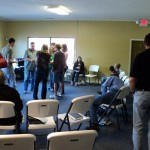They thought they knew Jesus, but they still had much to learn
Jim at “Crossroad Junction” has written a very good (and challenging) post called “My Shattered Reality.”
He begins his post with a look back at the post-resurrection followers of Jesus. And, when I say “post-resurrection,” I mean immediately after the resurrection before they saw and spent time with the risen Jesus.
Jim writes:
His resurrection was so outside their reality and frame of reference that even when He was standing right in front of them, they only saw a stranger, and not Him.
They thought they knew Jesus, and to a limited extent they did. But only in terms of their own pre-resurrection reality.
Post-resurrection, they simply couldn’t get their minds around the bigger reality of who Jesus really was and what He really was about, because a resurrected Jesus did not conform to the Jesus they thought they knew, had lived with, saw crucified and helped bury.
He continues the post by comparing our own limited understanding of Jesus to these early followers. Like them, we think we know Jesus – and we do know him somewhat – but our understanding is limited. Regardless of how much we know, how long we’ve lived with him, how mature we are, there is always more of Jesus to know.
Of course, even after Jesus spent 40 more days with those early believers after his resurrection, and even after they had been indwelled by the Holy Spirit, they still had much to learn. It reminds me that Paul often prayed that his readers would continue to know and understand Jesus.
This is challenging… and encouraging… at the same time.
The difference between sitting in rows and sitting in a circle
I was recently introduced to a website called “Church in a Circle,” and I want to point you to their latest post called “One simple trick every church can use to change passive listeners into active learners.”
There are many, many Christians who are beginning to recognize the importance of conversing (discussing) together as an addition to (or in some cases a replacement of) the sermon or monologue teaching. But, even though they recognize how helpful discussions (dialog) can be, they’re not sure how to implement it when they gather together, because they only have experience with listening to one person teach (preach).
The post (linked to above) offers several “tricks” to help believers move away from passive listening (i.e., only one person actively speaking) and toward the opportunity for many to actively speak and serve.
Now… here’s a little personal history…
The believers who we gather with regularly began as a very traditional and organized group with a weekly sermon. But, as we studied Scripture together, we saw the importance of dialog and discussion for mutual edification and maturity. (Everyone didn’t agree, of course, but that’s a different story.)
But, like I mentioned earlier, we didn’t know how to incorporate dialog into our gatherings. So, we started slowly with some of the suggestions mentioned in the post (linked to above). Today, instead of sitting in rows listening to one person teach, we sit in a circle and discuss Scripture and topics amongst one another, listening for how God would speak through any of us.
Each step we took in the process was a little scary… it was something new and different after all. And, we took a couple of missteps that we later corrected together. But, God was faithful, and as we moved closer and closer to the pattern that we find in Scripture, we noticed a huge different in relationship and maturity.
Now, sitting in circles does not suddenly cause everyone to want to edify each other. But, it does facilitate mutual edification.
So… take the next step.
Have you had any experience in moving away from one person speaking (monologue) and toward multiple people speaking (dialog or discussion)? Did you make the move all at once, or one step at a time?
More people writing about how we use the word CHURCH
Two of my favorite bloggers are writing about how we use the word “church”:
Miguel at “God Directed Deviations” wrote a post called “‘Where do you get fed?” And by that, ‘I mean where do you go to church?’”
And Jon at “Jon’s Journey” wrote a post called “What Do You Mean By Church?”
Each post asks a different – but important – question, and each one shows the importance of thinking about how we use words, especially the word “church.” (Although, we could include many different words in these kinds of discussions.)
I would encourage you to read both posts and respond in the comments at their respective sites.
How do we use the Old Testament to understand the church?
My friend Eric at “A Pilgrim’s Progress” has written a very good post called “Why do you ignore the Old Testament?”
The question that Eric raises is this: “In what way should the Old Testament inform our understanding of the church and how we should interact with one another?”
As he points out, some modern organizational structures among the church are often justified and explained by referring to similar structures found in the Old Testament. Eric suggests that this is a misuse of the Old Testament.
He especially points to the book of Hebrews in which the author identifies many of those structures as “shadows” that were meant to point to Jesus Christ.
The interesting thing, as one person mentions in the comments, is that the earliest followers of Jesus did not have the New Testament. And, they were exhorted to consider the Old Testament Scriptures as important for their lives (even for their learning, according to Paul).
So, I’ll ask you, how do we use the Old Testament to help us understand how to live with and interact with one another as God’s children?
Singing to one another
Josh at “In Search of the City” is asking a great question (and answering it, by the way) in his post “Sing to one another?” As he points out, most singing by Christians today is done to God or about God.
But, as Josh says, we often miss the scriptural exhortations to also sing to one another with the purpose of edifying one another.
After sharing a quote from Ephesians 5:19, he writes:
Here Paul encourages the saints to sing not only to God but to one another. In Colossians he says basically the same thing, only with an emphasis on teaching and admonishing one another through song (Colossians 3:16).
When was the last time you were part of a church meeting where the members sang directly to one another? Yeah, it’s been a while for me, too.
At any rate, it’s a great practice which I highly recommend.
Then, believe it or not, Josh actually shares the lyrics to a song that written to him as a gift.
I’ve noticed that many of the songs that we sing today are missing the “one another” aspect that is so important in Scripture.
Do you know of any songs that include or emphasize this aspect of our mutual relationships in Christ? (The last time I asked this question, I learned about a song that I had never heard before. I’m hoping for something similar this time.)
Making a mess of the church?
Donald at “The Unapologetic Prophet” has written a very good post called “We have made the church a mess indeed, indeed.” Interestingly, his post is a continuation of a discussion that he started on a post here on this blog. (I love that kind of blogging, by the way – the kind that moves from place to place and continues and expands discussions…)
In his post, Donald is talking about how we have taken God’s design for the church that he created and how we have modified it and messed it up.
While there are several good points in his post, I want to point out these three:
1. We have taken that which is meant to be Unified, and sliced it apart for the sake of personal comfort though denominational labels. We have divided Her.
2. We have taken that which is meant to be lovely and virtuous, and scarred Her face and body with our failed theologies, our forced mandates, our religious expectations that serve to only damage Her and defy Unity.
3. We have allowed The World, through the futile machinations and manipulations of human politics, both Conservative and liberal, to invade The Church like a foreign army, shooting the wounded and taking prisoners as slaves.
Yep. In many ways, we are not reflecting the headship of Jesus Christ and his control over his body.
Of course, the body of Christ has always been a “mess”… reading any of the letters of the New Testament shows that humans consistently get in the way of what Jesus wants to do with his church. That doesn’t excuse it, of course.
The question is, are we willing to admit it, repent, and submit to him? Or, do we keep going on as we’ve been doing?
Until we are perfected, our lives individually and together will continue to be messy. But, are we also moving toward maturity (perfection) or are we happy living in our mess?
Letting go… to find real fellowship in Christ
Jim at “Crossroad Junction” has written a very good post called “Finding Ekklesia.” He touches on a subject that I’ve written about a few times as well.
I often get emails or phone calls or Twitter/Facebook messages asking something like this, “How do I find authentic fellowship?” Well, that’s what Jim’s post is all about.
And, before jumping ahead too much, don’t miss this statement at the beginning of his post:
As I’ve thought about this, it’s been hard for me to know how to respond. The last thing anyone needs is another “program”, “method” or “three easy steps” to find something that God designed to be authentically birthed, and sustained, organically.
Like Jim said, fellowship is something that we are designed for by God and empowered for by the Holy Spirit. So, if fellowship is natural for the follower of Jesus Christ, then why is it still so hard to find?
Jim touches on this later in his post:
Trust me. It really isn’t that hard. I have helped spark real fellowship time and again in different communities based on just that simple approach.
If that means letting go of the hurts that have defined you, then forgive and begin pursuing health.
If it means letting go of the sensibilities that have limited you, then let the washing of your mind through the power of His word begin to transform you.
If it means getting out of your lifeless funk, then maybe it’s time to get off your knees and start doing the things that bring you joy in the Lord – even if it is not “spiritual” – and then start expressing His resulting joy to others, because joy is life, and life is contagious.
(There’s much, much more in Jim’s post, so don’t stop reading with my excerpts.)
So, why is fellowship so hard for us? Because we don’t want to “let go”…
The Community of Christ and Correction
Miguel at “God Directed Deviations” has written a good post called “Remember the guy who Paul the Apostle ‘Delivered Unto Satan for the destruction of his flesh so that his soul might be saved’?” (Yeah, that’s a long title, Miguel.)
In the post, Miguel is talking about “church discipline” as it is commonly called today (although the phrase is not used in Scripture). He quotes passages from 1 Corinthians 5 and 2 Corinthians 2 to paint a full picture of what happened between this man and the church in Corinth.
Make sure to read Miguel’s post.
Here’s something that’s usually not discussed in relation to this topic: This all assumes real community in Christ – i.e., real relationships between people. Otherwise, when we refuse to fellowship with and spend time with someone, then nothing is missing. A deep common relationship with Christ is necessary for this kind of correction.
What do you think?
He wants to be called “Saint James”
James at “Seeking a Kingdom” asks us to call him “James, Saint James.”
Well, not really. Sarcastically, of course.
In his post, James is pointing out the completely unscriptural practice of giving a follower of Jesus Christ a title (of any kind) and revering certain believer above others. Of course, among most believers that I know, the title usually revered is “pastor” – which is the title that James writes about in his post.
It’s difficult to find a small part of James’ post to quote/excerpt, so please jump over and read the whole thing.
Like James, I’m concerned when I hear terms related to certain spiritual gifts or certain functions applied as titles and when those terms / titles / positions are revered above others followers of Jesus Christ. I’m even more concerned when someone requests (or requires) people to call them by a certain title.
The funny thing is, I’ve also heard other terms (like “brother” or “sister”) used as titles with very little understanding of what the terms mean. For instance, someone calling someone else “Sister So-and-so” or “Brother So-and-so” without actually treating that person like a brother or sister in Christ.
So, I guess it works both ways. That’s why I always ask people to just call me Alan.
What will the church look like in the future?
Randy at “Bible Study Geek” has written a very good post called “Demise and Rebirth.”
By the way, I love the title of his blog, “Bible Study Geek,” and I love that he includes the verb “grok” in the description, “Nerd Groks Word” (under the title of his blog). (HT: Robert A. Heinlein)
In this particular post, Randy foresees the demise of the modern church organizational structures. While I think the various organizations are going to hang around for awhile, I wanted to point you to his post because of the way the post ends:
What will the church look like in the future? Nothing like what you probably think of as church, that is certain.
- Your church will be more like what you think of as a small group today.
- Leadership structures will be flexible and dynamic.
- Your church won’t own property.
- No one in your church will be paid by the church.
- Your church will demonstrate love for one another like you’ve never seen before.
- Your church will be like your family instead of like your club.
- You will be both a disciple and a mentor.
Randy’s “church of the future” sounds very familiar to me…










